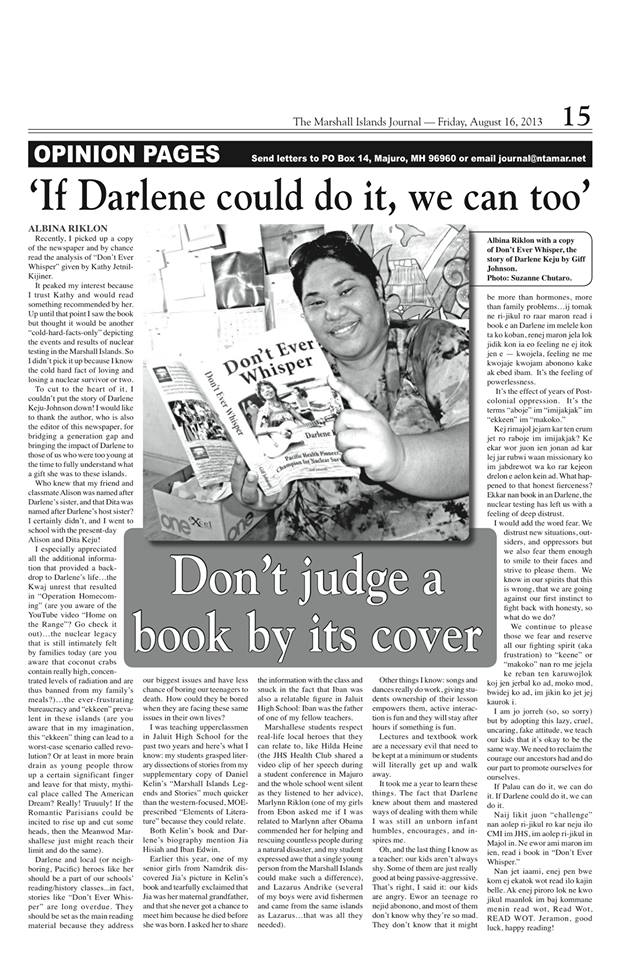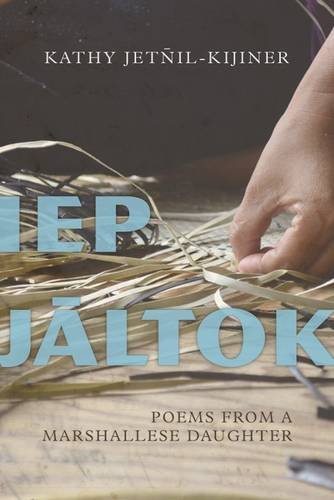
Albina Riklon’s thought provoking review of Giff Johnson’s “Don’t Ever Whisper” printed in the Marshall Islands Journal
Note: My review of Giff Johnson’s book “Don’t Ever Whisper”, a biography of Marshallese nuclear activist /grassroots organizer Darlene Keju-Johnson was published in the Marshall Islands Journal (you can read it in my previous post or here:http://jkijiner.wordpress.com/2013/09/19/book-review-dont-ever-whisper-by-giff-johnson/
Apparently, Albina Riklon, whom I know through CMI and have hung out with before (an awesome teacher btw), read the review and it prompted her to buy the book and read it herself. Below is her own review – thoughtful and definitely sharp to say the least. I especially appreciated her honest and straightforward critiques of Marshallese society today, as well as her own experiences as a teacher on Jaluit. Very brave, and something I tend to shy away from, due to background as mainly an outside rimajol who’s spent most of my life outside of the Marshall Islands. Great job Albina!
ALBINA RIKLON
Recently, I picked up a copy of the newspaper and by chance read the analysis of “Don’t Ever Whisper” given by Kathy Jetnil-Kijiner.
It peaked my interest because I trust Kathy and would read something recommended by her. Up until that point I saw the book but thought it would be another “cold-hard-facts-only” depicting the events and results of nuclear testing in the Marshall Islands. So I didn’t pick it up because I know the cold hard fact of loving and losing a nuclear survivor or two.
To cut to the heart of it, I couldn’t put the story of Darlene Keju-Johnson down! I would like to thank the author, who is also the editor of this newspaper, for bridging a generation gap and bringing the impact of Darlene to those of us who were too young at the time to fully understand what a gift she was to these islands.
Who knew that my friend and classmate Alison was named after Darlene’s sister, and that Dita was named after Darlene’s host sister? I certainly didn’t, and I went to school with the present-day Alison and Dita Keju!
I especially appreciated all the additional information that provided a backdrop to Darlene’s life…the Kwaj unrest that resulted in “Operation Homecoming” (are you aware of the YouTube video “Home on the Range”? Go check it out)…the nuclear legacy that is still intimately felt by families today (are you aware that coconut crabs contain really high, concentrated levels of radiation and are thus banned from my family’s meals?)…the ever-frustrating bureaucracy and “ekkeen” prevalent in these islands (are you aware that in my imagination, this “ekkeen” thing can lead to a worst-case scenario called revolution? Or at least in more brain drain as young people throw up a certain significant finger and leave for that misty, mythical place called The American Dream? Really! Truuuly! If the Romantic Parisians could be incited to rise up and cut some heads, then the Meanwod Marshallese just might reach their limit and do the same).
Darlene and local (or neighboring, Pacific) heroes like her should be a part of our schools’ reading/history classes…in fact, stories like “Don’t Ever Whisper” are long overdue. They should be set as the main reading material because they address our biggest issues and have less chance of boring our teenagers to death. How could they be bored when they are facing these same issues in their own lives?
I was teaching upperclassmen in Jaluit High School for the past two years and here’s what I know: my students grasped literary dissections of stories from my supplementary copy of Daniel Kelin’s “Marshall Islands Legends and Stories” much quicker than the western-focused, MOE-prescribed “Elements of Literature” because they could relate.
Both Kelin’s book and Darlene’s biography mention Jia Hisiah and Iban Edwin.
Earlier this year, one of my senior girls from Namdrik discovered Jia’s picture in Kelin’s book and tearfully exclaimed that Jia was her maternal grandfather, and that she never got a chance to meet him because he died before she was born. I asked her to share the information with the class and snuck in the fact that Iban was also a relatable figure in Jaluit High School: Iban was the father of one of my fellow teachers.
Marshallese students respect real-life local heroes that they can relate to, like Hilda Heine (the JHS Health Club shared a video clip of her speech during a student conference in Majuro and the whole school went silent as they listened to her advice), Marlynn Riklon (one of my girls from Ebon asked me if I was related to Marlynn after Obama commended her for helping and rescuing countless people during a natural disaster, and my student expressed awe that a single young person from the Marshall Islands could make such a difference), and Lazarus Andrike (several of my boys were avid fishermen and came from the same islands as Lazarus…that was all they needed).
Other things I know: songs and dances really do work, giving students ownership of their lesson empowers them, active interaction is fun and they will stay after hours if something is fun.
Lectures and textbook work are a necessary evil that need to be kept at a minimum or students will literally get up and walk away.
It took me a year to learn these things. The fact that Darlene knew about them and mastered ways of dealing with them while I was still an unborn infant humbles, encourages, and inspires me.
Oh, and the last thing I know as a teacher: our kids aren’t always shy. Some of them are just really good at being passive-aggressive. That’s right, I said it: our kids are angry. Ewor an teenage ro nejid abonono, and most of them don’t know why they’re so mad. They don’t know that it might be more than hormones, more than family problems…ij tomak ne ri-jikul ro raar maron read i book e an Darlene im melele kon ta ko koban, renej maron jela lok jidik kon ia eo feeling ne ej itok jen e — kwojela, feeling ne me kwojaje kwojam abonono kake ak ebed ibam. It’s the feeling of powerlessness.
It’s the effect of years of Post-colonial oppression. It’s the terms “aboje” im “imijakjak” im “ekkeen” im “makoko.”
Kej rimajol jejam kar ten erum jet ro raboje im imijakjak? Ke ekar wor juon ien jonan ad kar lej jar rubwi waan missionary ko im jabdrewot wa ko rar kejeon drelon e aelon kein ad. What happened to that honest fierceness? Ekkar nan book in an Darlene, the nuclear testing has left us with a feeling of deep distrust.
I would add the word fear. We distrust new situations, outsiders, and oppressors but we also fear them enough to smile to their faces and strive to please them. We know in our spirits that this is wrong, that we are going against our first instinct to fight back with honesty, so what do we do?
We continue to please those we fear and reserve all our fighting spirit (aka frustration) to “keene” or “makoko” nan ro me jejela ke reban ten karuwojlok koj jen jerbal ko ad, moko mod, bwidej ko ad, im jikin ko jet jej kaurok I.
I am jo jorreh (so, so sorry) but by adopting this lazy, cruel, uncaring, fake attitude, we teach our kids that it’s okay to be the same way. We need to reclaim the courage our ancestors had and do our part to promote ourselves for ourselves.
If Palau can do it, we can do it. If Darlene could do it, we can do it.
Naij likit juon “challenge” nan aolep ri-jikul ro kar neju ilo CMI im JHS, im aolep ri-jikul in Majol in. Ne ewor ami maron im ien, read i book in “Don’t Ever Whisper.”
Nan jet iaami, enej pen bwe kom ej ekatok wot read ilo kajin belle. Ak enej piroro lok ne kwo jikul maanlok im baj kommane menin read wot, Read Wot, READ WOT. Jeramon, good luck, happy reading!

I knew both Giff and Darlene many years ago when they lived in Hawai’i, along with Giff’s parents while we were all expending lots of energy opposing the imperial war against Vietnam. I just happened to see in a People’s Fund newsletter, a reference to “Don’t Ever Whisper,” noted that it was written by Giff as a tribute to his then wife, and plugged in her name in a search engine and found this review and pictures of her. I am forwarding the info to two key people here in Maine who are active in the anti-nuclear and anti-imperialist movement (as I still am). With solidarity and much aloha, Jon Olsen, in Maine